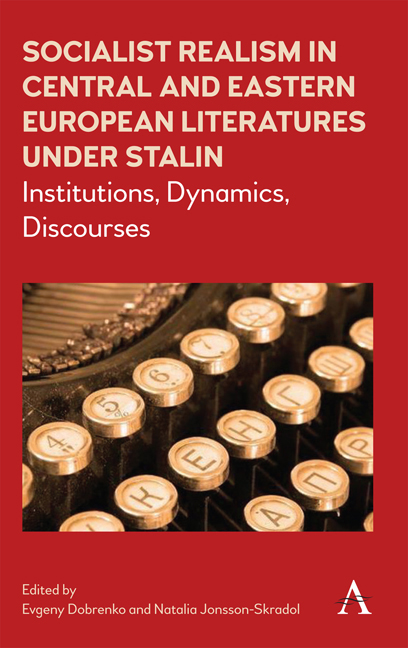 Socialist Realism in Central and Eastern European Literatures under Stalin
Socialist Realism in Central and Eastern European Literatures under Stalin Book contents
- Frontmatter
- Contents
- Acknowledgements
- Introduction
- Part 1 Institutions
- 1 How Socialist Realism Was Exported to Eastern European Countries and How They Got Rid of It
- 2 Literary Monopolists and the Forging of the Post–World War II People's Republic of Letters
- 3 Once Dr Faul Has Left: The Agony of Socialist Realism in Poland, 1955–56
- 4 From Literature Censored by Poets to Literature Censored by the Party: Censorship in the Czech Literary Culture of 1945–55
- 5 The Demise of ‘Socialist Realism for Export’ in 1947: VOKS Receives John Steinbeck and Robert Capa
- 6 The Soviet Factor and the Institutionalization of Bulgarian Literature after World War II
- 7 Cultural Renewal in Eastern Germany – Mission Impossible for Soviet Cultural Officers and German Anti-Fascists?
- Part 2 Dynamics
- Part 3 Discourses
- Conclusion
- List of Contributors
- Index
2 - Literary Monopolists and the Forging of the Post–World War II People's Republic of Letters
from Part 1 - Institutions
Published online by Cambridge University Press: 10 May 2018
- Frontmatter
- Contents
- Acknowledgements
- Introduction
- Part 1 Institutions
- 1 How Socialist Realism Was Exported to Eastern European Countries and How They Got Rid of It
- 2 Literary Monopolists and the Forging of the Post–World War II People's Republic of Letters
- 3 Once Dr Faul Has Left: The Agony of Socialist Realism in Poland, 1955–56
- 4 From Literature Censored by Poets to Literature Censored by the Party: Censorship in the Czech Literary Culture of 1945–55
- 5 The Demise of ‘Socialist Realism for Export’ in 1947: VOKS Receives John Steinbeck and Robert Capa
- 6 The Soviet Factor and the Institutionalization of Bulgarian Literature after World War II
- 7 Cultural Renewal in Eastern Germany – Mission Impossible for Soviet Cultural Officers and German Anti-Fascists?
- Part 2 Dynamics
- Part 3 Discourses
- Conclusion
- List of Contributors
- Index
Summary
As an heir to the pre- revolutionary Russian intelligentsia, the Bolshevik state, down to its very bureaucracy, was highly literature- centric. From very early on in this state's existence, it projected in its dealings with foreign countries a belief in literature's capacity to change society; thus, it tried to organize ‘the progressive forces’ of world literature through international writers’ organizations, writers’ congresses, frequent bilateral visits, multilingual literary magazines and massive translation initiatives. Once developed, these organizing forms stayed relatively constant; what changed was Soviet foreign policy, and with it, Soviet cultural policy abroad. As the sectarian Third Period of the late 1920s and early 1930s gave way to the more inclusive coalition of the Popular Front so, too, was MORP replaced by the more ecumenical Association of Writers for the Defence of Culture. While World War II drastically reduced the flow of texts and their authors across Soviet borders, literary internationalism re- emerged into the Cold War fragmented into three geopolitical worlds. In the Thaw era, a European Association of Writers served as the main platform of Soviet interactions with the literary West. When its work was boycotted by West European writers in the mid- and late 1960s, following the trials of Andrei Siniavskii and Iulii Daniel’, Joseph Brodsky, Aleksandr Solzhenitsyn and ultimately, the Warsaw Pact crushing of the Prague Spring, the Soviet cultural bureaucracies had to resign themselves to smaller, less ambitious venues for reaching out to European and North American leftist literature.
This is a familiar story. There is, however, a curious scholarly blind spot in most accounts of mid- twentieth- century Soviet cultural internationalism. They either end with the beginning of World War II or begin with the Thaw. Indeed, while we have excellent studies on the rich literary networks connecting the USSR and the West in the 1920s and 1930s (Katerina Clark's Moscow, the Fourth Rome (2011) and Michael David- Fox's Showcasing the Great Experiment (2013)) and a body of scholarship (Eleonory Gilburd's To See Paris and Die! (2018) and Tobias Rupprecht's Soviet Internationalism after Stalin (2015)) is emerging on the topic for the Thaw), those phenomena remain curiously understudied for the in- between period.
- Type
- Chapter
- Information
- Socialist Realism in Central and Eastern European Literatures under StalinInstitutions, Dynamics, Discourses, pp. 25 - 38Publisher: Anthem PressPrint publication year: 2018


